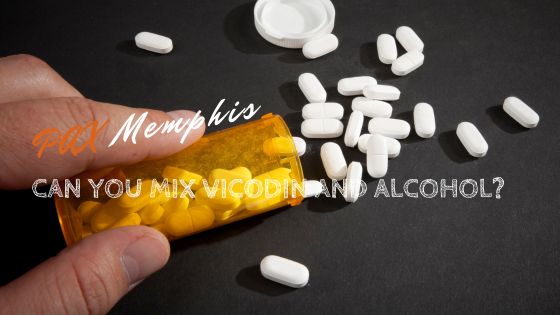Vicodin is the name brand for an opioid medication known as hydrocodone.[1] Hydrocodone treats severe pain after surgery, during a chronic illness, or after an accident. While Vicodin is effective in managing pain, it is habit-forming and highly addictive.
If you are prescribed Vicodin, you might not think twice about having a glass of wine or a beer here and there. While occasional drinking is not a big deal, it can be if you are taking an opioid medication like Vicodin. Because alcohol and hydrocodone are both central nervous system depressants, mixing these substances can have deadly consequences.
While the mixture of Vicodin and alcohol can cause a pleasurable intoxicating effect, you should never combine the two.
What are the Effects of Vicodin?
Vicodin relieves pain by changing the way your brain responds to pain signals that your body sends. It is also a central nervous system depressant, so it causes feelings of drowsiness, dizziness, and even euphoria. As a result, many people begin abusing Vicodin to get high.
The effects of Vicodin include:[1]
- Dizziness and drowsiness
- A rush of euphoria
- Nausea and vomiting
- Constipation
- Lightheadedness
- Itching
- Dry mouth
When hydrocodone is taken in excess, it can lead to an overdose. Symptoms of a Vicodin overdose may include confusion, shallow breathing, cold or clammy skin, seizures, coma, and death.
What are the Effects of Alcohol?
Like Vicodin, alcohol is a central nervous system depressant, meaning it slows down activity in the brain. People experience symptoms like poor coordination and decreased energy levels when they drink alcohol.
Additionally, alcohol affects neurotransmitters in your brain known as gamma-aminobutyric acid (GABA) which cause you to experience relaxation and sedative effects on your muscles, heart rate, and speech centers, and regulates other parts of the brain.
Effects of alcohol include:[2]
- Relaxation
- Reduced tension
- Lowered inhibitions
- Issues concentrating
- Slowed reflexes and reaction times
- Poor coordination
- Slowed activity in the brain
- Nausea and vomiting
In very large doses, you can experience an alcohol overdose. This is also known as “alcohol poisoning.” Overdosing on alcohol can lead to fatal consequences, such as breathing difficulties, seizures, and coma.
The Dangers of Mixing Vicodin and Alcohol
When you combine Vicodin and alcohol, the substances can increase the sedative effects of one another, causing an array of adverse effects on your body, mainly if you are abusing them in large quantities.
Some of the dangers associated with mixing alcohol and Vicodin include:[3]
- Shallow breathing
- Loss of consciousness
- Brain damage
- Nausea and vomiting
- Liver complications
- Mental confusion
- Hallucinations and delusions
- Numbness
- Loss of vision
- Seizures
- Coma
- Central nervous system and respiratory depression
Both opioids and alcohol act as central nervous system depressants, and using both substances at the same time can produce significant respiratory depression, increasing the overdose risk.[4]
If you are prescribed Vicodin you should avoid alcohol altogether. On the other hand, people intentionally abusing alcohol and opioids should seek professional addiction treatment immediately.
Signs You Are Addicted to Vicodin and Alcohol
Sometimes it can be difficult to determine whether you are struggling with an addiction. If you are regularly combining alcohol and hydrocodone to experience a specific intoxicating effect, you are probably suffering from an addiction.
The signs that you are addicted to Vicodin and alcohol include:
- Running out of your Vicodin prescription early
- Going to more than one doctor to receive multiple prescriptions of Vicodin (“doctor shopping”)
- Combining alcohol and Vicodin to get high
- Experiencing symptoms of withdrawal when you cannot abuse alcohol or hydrocodone
- Dealing with uncontrollable urges or cravings to abuse alcohol and hydrocodone
- Needing to increase the dose of your Vicodin and alcohol to experience the desired effect (building a tolerance)
- Spending a lot of time thinking about, using, and recovering from the effects of alcohol and Vicodin
- Continuing to abuse the substances despite facing social, financial, or mental and physical health problems as a direct result
If you experience the above-mentioned symptoms of addiction, you should seek treatment for alcohol and Vicodin abuse.
Find Help for Vicodin and Alcohol Abuse
If you or a loved one frequently abuses Vicodin and alcohol, it’s time to seek professional help. Combining these substances can lead to life-threatening overdoses and potentially lead to coma or death. As a result, you must receive the support and treatment you deserve.
To get connected with an addiction treatment program for Vicodin and alcohol abuse, contact PAX Memphis today.
References:
- Medline Plus: Hydrocodone, Retrieved July 2023 From https://medlineplus.gov/druginfo/meds/a614045.html
- The Administrative Office of the Courts (AOC): Short and Long Term Effects of Alcohol, Retrieved July 2023 From https://www2.courtinfo.ca.gov/stopteendui/teens/resources/substances/alcohol/short-and-long-term-effects.cfm#content
- The University of Michigan: The Effects of Combining Alcohol With Other Drugs, Retrieved July 2023 From https://uhs.umich.edu/combine
- The National Library of Medicine (NLM): Alcohol and Opioid Use, Co-Use, and Chronic Pain in the Context of the Opioid Epidemic: A Critical Review, Retrieved July 2023 From https://www.ncbi.nlm.nih.gov/pmc/articles/PMC5832605/
Medically Reviewed: September 25, 2019

All of the information on this page has been reviewed and verified by a certified addiction professional.










